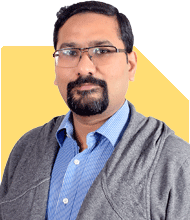Aashish Sood |127 Answers |Ask -Follow
CAT, Management Expert - Answered on Feb 28, 2024
He also mentors management student hopefuls for the group discussion and personal interview rounds that follow competitive examinations.
He has appeared for CAT seven times since 2016 and scored in the 99.9 percentile.
Sood has 16 years of work experience as a management consultant, strategy consultant and research associate.... more

I have failed in every competitive exam I appeared. I am 29 and I don't have a permanent job yet. My goal was very clear, to get a government job and work in India and make my parents proud. But I am not sure where I am going wrong. I have taken so many career gaps to appear for these exams. Should I just give up or keep trying till I crack it?
1. Take some time to reflect on your exam preparation strategies, study habits, and performance in previous exams. Identify areas where you may need improvement and consider seeking feedback from mentors, tutors, or peers who have successfully cleared similar exams.
2. While the primary goal may have been to secure a government job, it's essential to remain open to alternative career paths and opportunities. Explore other industries, sectors, or job roles where your skills and experiences could be valuable.
3. Perseverance is key when faced with setbacks and challenges. It's natural to encounter obstacles along the way, but it's essential to stay determined and continue working towards your goals.
4. Consider seeking assistance from professional tutors, coaching centers, or exam preparation courses that specialize in the exams you're targeting.
5. Start thinking how you can effectively address the gaps in your resume and interviews. Highlight any relevant skills, experiences, or achievements gained during these periods, and emphasize your commitment to achieving your career goals.
6. It's essential to prioritize your mental health and well-being during challenging times. Practice self-care, maintain a healthy work-life balance, and seek professional support if you're feeling overwhelmed or experiencing mental health concerns.
You may like to see similar questions and answers below
Maxim Emmanuel | Answer |Ask -Follow
Soft Skills Trainer - Answered on Apr 24, 2024
Ulhas Joshi |280 Answers |Ask -Follow
Mutual Fund Expert - Answered on Dec 05, 2025
Dr Dipankar Dutta |1835 Answers |Ask -Follow
Tech Careers and Skill Development Expert - Answered on Dec 04, 2025
Ravi Mittal |676 Answers |Ask -Follow
Dating, Relationships Expert - Answered on Dec 04, 2025
Anu Krishna |1745 Answers |Ask -Follow
Relationships Expert, Mind Coach - Answered on Dec 04, 2025
Anu Krishna |1745 Answers |Ask -Follow
Relationships Expert, Mind Coach - Answered on Dec 04, 2025
Mayank Chandel |2562 Answers |Ask -Follow
IIT-JEE, NEET-UG, SAT, CLAT, CA, CS Exam Expert - Answered on Dec 04, 2025
Mayank Chandel |2562 Answers |Ask -Follow
IIT-JEE, NEET-UG, SAT, CLAT, CA, CS Exam Expert - Answered on Dec 04, 2025
Mayank Chandel |2562 Answers |Ask -Follow
IIT-JEE, NEET-UG, SAT, CLAT, CA, CS Exam Expert - Answered on Dec 04, 2025
Mayank Chandel |2562 Answers |Ask -Follow
IIT-JEE, NEET-UG, SAT, CLAT, CA, CS Exam Expert - Answered on Dec 04, 2025
Mayank Chandel |2562 Answers |Ask -Follow
IIT-JEE, NEET-UG, SAT, CLAT, CA, CS Exam Expert - Answered on Dec 04, 2025























